

6/6/2018 Engaging Families of Infants and Toddlers with Disabilities Strategies to Enhance Your Practice Agenda You will learn more about: ➢ The everyday context of families with young children with disabilities ➢ Strategies for enhancing program systems that support families of young children with disabilities ➢ Professional development strategies for staff https://www.earlychildhoodwe binars.com/presentations/engag ing-families-of-children-with- disabilities-systematically- planning-to-create-positive- experiences-and-meet- expectations-amanda-schwartz/ 1
6/6/2018 POLL The Everyday Experiences of Families of Young Children with Disabilities What is it like to have a young child with a disability? Welcome to Holland 2
6/6/2018 Letting Go Of Expectations: Kubler-Ross Stages of Grief Stage Description Denial “This can’t be happening to me!” Anger ”Life isn’t fair. Why is this happening to me?” Bargaining “If I do this , it won’t happen and everything will be fine.” Depression ”Who cares anymore? I give up.” Acceptance ”It’s happening and I can handle it.” 3
6/6/2018 The Role of Routines What are Routines? • Predictable • Functional • Happen many times across the day (Woods, Kashinath, & Goldstein, 2004) The Role of Routines Types of Routines? • Play • Caretaking • Social • Learning Activities • Community and Family (Jennings, Hanline, & Woods, 2012) The Role of Routines From Results Matter: Colorado Department of Education https://www.cde.state.co.us/resultsmatter/blakesstory 4
6/6/2018 Consider: 1. How do the details of a family’s daily life help you understand their experience? 2. How does your interaction with families: • Build on their strengths? • Help them deal with their challenges? • Support them in their daily lives? • Drive their vision for their child’s future? Strategies for Enhancing Systems of Support for Families of Young Children with Disabilities Strategies for Engaging Families of Young Children with Disabilities Supportive Two-Way Collaboration Transitions at Communication with Families and Program Entrance Systems Specialists 5
6/6/2018 Supportive Transition at Program Entrance – Welcoming strategies – Presenting an inclusive physical environment – Gathering relevant information – Connecting with mentor family Supportive Transitions at Individual Family Service Plan Plan-At-A-Glance Section 1: Child/Family Information Program Entrance Child ’ s Name: DOB: Parent/Guardian ’ s Name: Preferred Phone Number: Parent/Guardian ’ s Name: Preferred Phone Number: Section 2: Service Provider Information Service Coordinator: OT: Phone: Phone Number: – Partnering with early Email: Email: SLP: PT: Phone Number: Phone Number: intervention providers Email: Email: Special Instructor: Social Worker: Phone Number: Phone Number: Email: Email: – Summarizing specialized Other: Other: Phone Number: Phone Number: Email: Email: services with an IFSP-At-A- Section 3: Service Summary Glance form Provider Amount of Service Schedule 1 st and 3 rd Mondays, 10AM EG: Special Instructor 1 hour, 2X/month – Contact Information Section 4: Outcome Summary Outcome #1 – Service Providers Outcome #2 Outcome #3 – Schedule Outcome #4 – Outcomes Supportive Transitions at Program Entrance – Implementing screening and – Ensuring staff referral practices – Understand typical child – Why screening? development – Identify developmental red flags – Screening tools – Know how to share information – Referral practices with families (particularly difficult information) – Partner well with other professionals 6
6/6/2018 Two-Way Communication Systems – Provide multiple ways to communicate – Are efficient & effective – Promote strong relationships Tools that Promote Two- Way Communication #1 Communication Notebook Tools that Promote Two- Way Communication #2 Daily Note 7
6/6/2018 Tools that Promote Two- Way Communication #3 LISTSERV Tools that Promote Two- Way Communication #4 Social Media Collaboration with Families and Specialists – Team Collaboration – Home-School Partnerships – Community Partnerships 8
6/6/2018 Collaboration with Families & Specialists ROUTINE IFSP OUTCOME STRATEGIES – Teaming Strategies Arrival – Routine Matrix for Feeding Infants Tummy Time – Teaming on the fly Diapering – Team meetings Home-School Partnerships Positive Parenting Home-School Partnerships Home Learning Strategies 9
6/6/2018 Home-School Partnerships – Emphasize child's physical health – Physical activity play – Nutrition – Handwashing – Toothbrushing Community Partnerships Professional Development Strategies for Staff 10
6/6/2018 Some Strategies • Specialized Training for Teaching Staff • Coaching on Partnering with Families • Resources to Support Conversations with Family Members SpecialQuest https://eclkc.ohs.acf.hhs. gov/children- disabilities/specialquest/ building-relationships- families Recorded Webinars from PACER http://www.pacer.org/livestream/archive.as p 11
6/6/2018 Watch Me! https://www.cdc.gov/nc bddd/watchmetraining/i ndex.html Being an Effective Mentor Coach “A Mentor -Coach is a journey guide — someone who walks beside another on her journey. Mentor-Coaches support professional development and work to build excellence in the daily practice of teaching staff. Teachers benefit from the support they receive from a more experienced professional who helps them reach their goals and share their challenges.” - JoAn Knight Herron Inform Talk about development regularly Share Share resources Conversation Listen Use active listening Tips Highlight Highlight the child’s strengths Prepare Be prepared Prioritize Start by asking families to start the conversation https://www.cdc.gov/ncbddd/ actearly/pdf/parents_pdfs/tip stalkingparents.pdf Follow up Follow up promptly 12
6/6/2018 http://www.parentcenter hub.org/childcare/#appro ach We’d love to hear from you! Amanda Schwartz, PhD Lorelei Pisha, EdD Lead Consultant Developmental Specialist Amanda Schwartz Early Intervention Consulting Partnerships a_l_schwartz@yahoo.com Lorelei.pisha@gmail.com www.eipcares.com 13
Recommend
More recommend